News & Blog
News about Sustainability
Stay up to date on sustainability.
We inform you about news on the subject of sustainability, eco-friendly living and working.
New developments, innovations, statistics & reports.
With ZeroWaste-Global to your eco-friendly business.

Why Hotels Should Adopt Plastic-Free Amenities
“A Greener Tomorrow: The Benefits of Plastic-Free Hotels”
“The Case for Plastic-Free Hotel Rooms: 10 Reasons to Make the Switch”
The hospitality industry has a significant impact on the environment, and one of the major contributors to the degradation of the environment is the use of plastic amenities in hotel rooms. From shampoo bottles to toothbrushes, these single-use items contribute to plastic waste and pollution. With this in mind, hotels should consider switching to plastic-free amenities. This paper discusses ten reasons why hotels should adopt plastic-free amenities.
Reduce plastic waste: Plastic is a non-degradable material that can take hundreds of years to decompose. The use of plastic amenities in hotel rooms generates a large amount of waste as these items are only used once and then discarded. By switching to plastic-free alternatives, hotels can significantly reduce the amount of plastic waste they produce.
Protecting the environment: The hospitality industry has a responsibility to protect and preserve the environment for future generations. By using plastic-free amenities, hotels can demonstrate their commitment to the environment and show that they take their role as responsible stewards of the planet seriously.
Attract eco-conscious travellers: In recent years, more and more travellers have become environmentally conscious and are looking for hotels that align with their values. By using plastic-free amenities, hotels can attract these travellers who are looking for eco-friendly options and enhance their reputation among environmentally conscious consumers.
Cost savings: Although the initial investment in plastic-free alternatives may be higher, it can result in significant cost savings in the long run. For example, soap bars and bamboo toothbrushes last longer than their plastic counterparts, reducing the need for frequent replacement. In addition, the use of plastic-free amenities can also help hotels reduce their energy consumption and carbon emissions, resulting in cost savings in the form of reduced energy bills.
Health benefits: Plastic-free amenities are often made from natural materials, such as organic soap bars and bamboo toothbrushes. These natural alternatives are not only better for the environment, but also for guests’ health, as they contain fewer chemicals and harmful ingredients than plastic alternatives.
Easy to implement: Switching to plastic-free amenities is straightforward and easy. Hotels can start by replacing the most commonly used items, such as shampoo and conditioner bottles, with bulk dispensers. This not only reduces waste, but also allows guests to control the amount of product they use, further reducing waste.
Innovative and unique: By switching to plastic-free amenities, hotels have the opportunity to offer guests a unique and innovative experience. For example, they can offer guests the option of using bars of soap instead of plastic-wrapped bars, which not only reduces waste but also allows guests to experience the natural benefits of soap made from organic ingredients.
Positive public relations: Adopting plastic-free amenities is a positive public relations move for hotels, as it sends a message to guests and the public that the hotel is committed to sustainability and environmental protection. This can increase customer loyalty and attract new customers looking for eco-friendly options.
Industry leadership: By taking the lead in introducing plastic-free amenities, hotels can set an example for other businesses and industries. This can lead to a domino effect, with more and more businesses following in their footsteps, ultimately reducing plastic waste and pollution on a larger scale.
Regulatory compliance: As more countries and local governments implement regulations to reduce plastic waste and promote sustainability, hotels must comply with these regulations to avoid penalties. By introducing plastic-free amenities, hotels can not only comply, but also stay ahead of the curve and demonstrate their commitment to sustainability and environmental protection.

Jörg Demuth
Sustainable Hotel Amenities
How to identify Fake Certificates
You need to be aware of the importance of verifying the validity of compost certification logos. For example, DIN/EN 13432 and NF T51-800:2015 are two compostability standards often cited by suppliers, but they only apply to packaging materials, such as bags or bin liners. Hotel amenities such as razors, toothbrushes, and combs can NOT claim compostability based on these standards and therefor will not been certified as compostable or even home compostable.
little organic items like bin bags that compost fully within 6 month will be certified. Therefore, razors, toothbrushes, and combs etc will not compost within 6 month and will not be certified compostable.
To avoid being misled by fake compost certification logos, you can take steps to ensure that the products they buy are truly compostable. One way is to look for certification logos from recognized bodies such as DIN CERTCO or TÜV Austria OK compost. These logos indicate that a product has been tested and certified to meet specific compostability standards.
They have registration numbers on their certificates / stamps that is attached to the registered company. Call DIN CERTCO or TÜV Austria, give them the number and you will immediately know if it is fake or real and if it is attached to the item and the company.
Let us know if need any help

Souhel
control everything and be careful with fakes

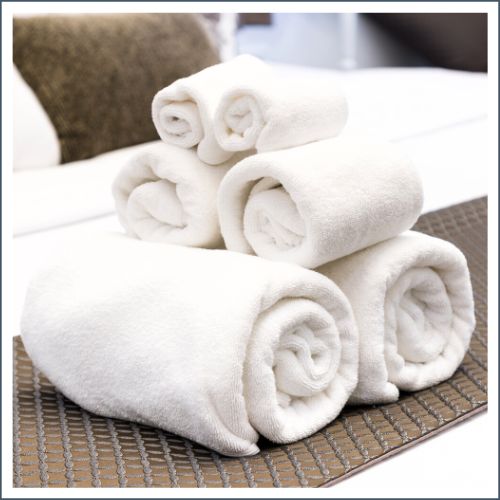
Sustainable Textiles
Modal towels and the future of sustainable textiles.
Hotel towels are typically made from three different primary materials: cotton, petroleum-based plastic and modal.
While each material has unique characteristics and environmental impacts, modal fibres stand out as the most environmentally friendly option.
Cotton is a natural fibre that is renewable but requires large amounts of water and pesticides to grow, leading to soil degradation, water pollution and a significant carbon footprint. In addition, cotton production involves chemical treatments that can be harmful to the environment and human health.
Petroleum-based plastic towels, such as those made from polyester, nylon or acrylic, have a significant environmental impact. The production of these synthetic materials requires non-renewable resources and produces greenhouse gases. In addition, plastic-based towels shed microfibres when washed, which can pollute waterways and harm marine life. Plastic-based towels are also non-biodegradable, meaning they will remain in the environment for hundreds of years.
Modal is a cellulose-based fibre made from beech trees. Modal uses less water and energy to produce than cotton or petroleum-based plastics. Modal is also biodegradable, which means it can break down naturally in the environment. However, the production of modal fibres requires the use of chemicals that can be harmful to the environment if not managed properly.
In terms of towel performance, both cotton and petroleum-based plastic towels are durable and absorbent, but have significant environmental impacts. Modal towels are soft, absorbent and environmentally friendly, but may not be as durable as cotton or petroleum-based plastic towels. However, by blending modal fibres with other fibres, weaving them tighter, using higher quality finishing techniques, selecting higher quality modal and washing them with care, the durability of modal towels can be improved.
The environmental impact of these materials goes beyond the type of fibre used and includes sustainable farming practices, responsible manufacturing and efficient use of water throughout the supply chain. While all three fibres have their unique advantages and disadvantages, Modal is the most sustainable choice for hotel towel production. Modal uses less water and energy and is biodegradable, making it more environmentally friendly than cotton or petroleum-based plastic.
In terms of end-of-life scenarios, plastic-based towels are not biodegradable and if they end up in landfill, they can take hundreds of years to decompose. Recycling plastic-based towels can help reduce their environmental impact, but the recycling process itself requires high energy consumption and generates emissions. Modal towels, on the other hand, are biodegradable and can decompose in soil or water. Modal towels can also be recycled, reducing the environmental impact of the manufacturing process.
Overall, modal fibres are a more sustainable choice for hotel towel production as they have a lower environmental impact and can be recycled or biodegraded at the end of their life. By choosing Modal towels, we can reduce our impact on the environment while still enjoying the softness and absorbency we expect from high quality towels.

Jörg Demuth
Sustainable Textiles
The Dark Side of Plastic Hotel Slippers:
Plastic is a ubiquitous material used in the manufacture of many consumer goods, including hotel slippers. However, while plastic offers many benefits such as durability, ease of production and low cost, it also has a significant environmental impact. This is particularly true of the different types of plastic used in hotel slippers, including polyethylene terephthalate (PET), polyethylene (PE), Nylon, thermoplastic rubber (TPR) and ethylene vinyl acetate (EVA) soles.
These are common plastics used in the manufacture of hotel slippers and other consumer goods. These plastics have significant negative impacts on the environment and oceans:
- Marine pollution: Plastic waste from hotel slippers and other products often ends up in the oceans, where it can harm marine life and disrupt fragile marine ecosystems. Plastic can entangle marine animals such as sea turtles and seals, and can be mistaken for food, leading to ingestion and suffocation.
- Microplastic pollution: Over time, plastic waste breaks down into smaller pieces called microplastics. These tiny particles are easily ingested by marine life, entering the food chain and potentially affecting human health.
- Greenhouse gas emissions: The production of plastics, including PET, PE, Nylon, TPR and EVA, is a significant source of greenhouse gas emissions, contributing to global warming and climate change.
- Chemical leaching: Some plastic products, including hotel slippers, can release toxic chemicals into the environment over time, especially when they break down in landfills or the ocean. This can affect soil, water and air quality.
- Landfill waste: Plastic waste from hotel slippers and other products often ends up in landfills, where it can take hundreds of years to decompose. This contributes to the growing problem of landfill waste, which is a source of pollution and environmental degradation.
In conclusion, the use of plastic materials such as PET, PE, Nylon, TPR, and EVA in hotel slippers and other consumer goods has significant negative impacts on the environment and oceans. Plastic waste can harm marine life, contribute to greenhouse gas emissions, and release toxic chemicals into the environment. It is important to consider alternative materials and implement more sustainable practices to reduce the impact of plastic on the environment and preserve our planet for future generations.
When plastic breaks down in the ocean, it can release toxic chemicals into the water, which can harm marine organisms and disrupt their reproductive processes. These chemicals can also enter the food chain, potentially affecting human health.
Here are several chemicals that are commonly found in plastic products and can harm the reproduction of marine life:
- Bisphenol A (BPA): BPA is a common ingredient in hotel slippers.
- Phthalates: Phthalates are commonly used in the production of plastic products, including hotel slippers, and are known endocrine disruptors.
- Polychlorinated biphenyls (PCBs): PCBs are a group of chemicals that were widely used in the past in the production of plastic products, including hotel slippers. They are highly toxic and persistent in the environment.
- Dioxins and Furans: Dioxins and furans are by-products of industrial processes, including the production of plastic products, including hotel slippers.
In conclusion, several chemicals found in plastic products, including BPA, phthalates, PCBs, dioxins, and furans, are all highly toxic and have been linked to disrupted hormonal systems and reduced fertility, to a range of reproductive problems in marine life, including decreased fertility and altered development.
It is therefore important to reduce the use of these chemicals in consumer products, including hotel slippers, to minimize the negative impact on marine ecosystems and their ability to reproduce.
Additionally, plastic waste in the ocean can entangle marine animals, causing suffocation and harm, and be mistaken for food, leading to ingestion and death. Therefore, it is crucial to reduce the use of plastic in consumer goods, including hotel slippers, to minimize the harmful impact of chemical leaching on marine ecosystems and their ability to reproduce.
One of the biggest problems with plastics is that they take hundreds of years to break down, which means that once they are discarded, they remain in the environment for a long time. This is a particular problem with plastic hotel slippers, which are often used for only a few hours to days before being discarded. The accumulation of plastic waste in landfills can cause significant environmental damage as it can release harmful chemicals into the soil and water.
Another problem with plastic is its impact on recycling. Plastic is not easily recyclable and many of the different types of plastic used in hotel slippers are not widely recyclable. For example, nylon and TPR are not widely accepted by recycling facilities, which means they often end up in landfill, where they can harm the environment. In addition, the different types of plastic used in hotel slippers can become contaminated with other materials, making them difficult to non-recycle and increasing the amount of waste sent to landfill.
So the claim, “can be recycled” is at the end of the day not true.
The production of plastic is also a major source of pollution. Plastic production uses significant amounts of fossil fuels, contributing to greenhouse gas emissions and global warming. In addition, many of the chemicals used to make plastic are toxic and can harm the environment and human health if not properly managed.
In conclusion, the use of plastic in hotel slippers creates a significant amount of waste and environmental damage. Plastic is not easily recyclable and the different types of plastic used in hotel slippers often end up in landfill, where they can release harmful chemicals into the environment. The production of plastic also contributes to greenhouse gas emissions and pollution. By choosing alternative materials for hotel slippers, such as natural fibres, hotels and other organisations can help reduce the environmental impact of waste and contribute to a more sustainable future.

Jörg D.
we develop alternatives


Sustainable Slipper
We live the ZeroWaste Lifestyle. Our slipper are comfortable, sustainable and chic.
You can wear them anywhere you go.
The slippers are also stylish in the club, on the beach, in the city. Relax on the boat, in the hotel, by the pool or on the balcony.
Custom made with natural materials.
From years of global experience in the hotel & spa business, we have made our own slippers.
The ZeroWaste slippers are tested and certified by Tüv Süd!
It was important to us to be able to implement these with our values. We have successfully accomplished this.
And designed a unique product in different designs.
100% plastic-free, washable, reusable & non-slip.
The hotel slippers are made of the finest materials such as cotton, jute & linen, coconut latex and cork.

Claudia H.
Sustainable Innovations
Minibar Deposit Glass Concept
Minibar in a deposit glass concept
Zerowaste brings a sustainable minibar concept to the market!
The idea of the circular economy and the zero-waste approach is an essential part of our corporate philosophy.
Everything is sustainable and ecological, from the lid to the glass, labels, and the contents.
What is better about our deposit glass concept?
- minimal waste is created by the lids labels, but both can be returned to the cycle after recycling.
- glass can contain up to 90% of used gas.
- glass in recycling saves energy. Used glass needs approx. 50% less energy in the melting process.
- glass can be remelted as often as desired.
- glass has a recycling rate of 90%, compared to plastic with 15%.
- deposit glasses can be refilled up to 50 times and are used for an average of six years.
- FSC certified paper and mineral oil-free printing
- PVC-free lids
- vegan raw materials
- fair trade product selection
- organic raw materials in the product selection
- Fairly traded products in product selection
- Organic and fairly traded products in product selection
Consistent commitment to less packaging waste
The new reusable packaging products are part of Zerowaste’s commitment to reducing hotel waste. Amenities of the Zerowaste line are put to the test and optimised under the focus of resource conservation and sustainability.

Jörg D.
Sustainable Innovations
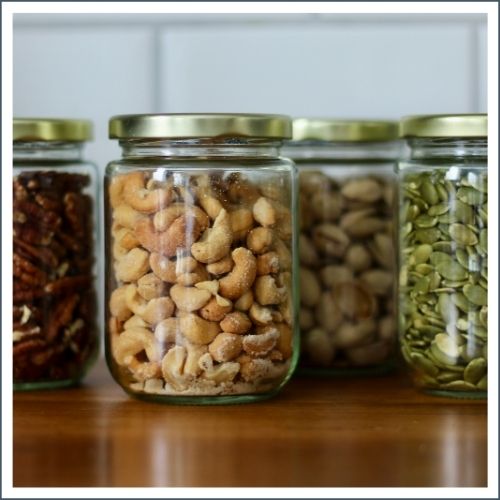
Individual Designable
Worlds First - Compostable Hotel Amenities - Sachets
Unique and incomparable. 100% compostable hotel amenities – plastic-free.
Our sachets can be freely designed in terms of shapes and colors. Individually suitable for your company.
We produce your designs individually with compostable materials.
The sachets are filled with the finest organic skin and hair care products. 100% natural cosmetics. Healthy for all ages and environmentally friendly at the same time.
The sachets are portioned hotel amenities intended for cleaning.
Due to the individual design, we enable tailor-made amenities for storage boxes.
After years of development, we have achieved our goal.
100% compostable sachets, hotel amenities, pouches and packaging have been developed.
Made in Germany
It perfectly protects the high-quality natural skin care products of Urb’n Nature.
The fine products and essential oils remain in the cosmetics without escaping through the packaging.
Perfect for the hotel industry.
Portioned shampoos, shower gels and lotions.
Organic, environmentally friendly and completely compostable.

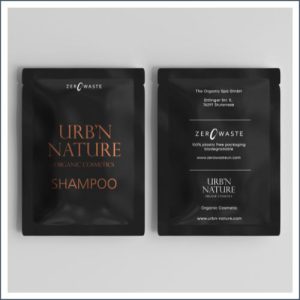





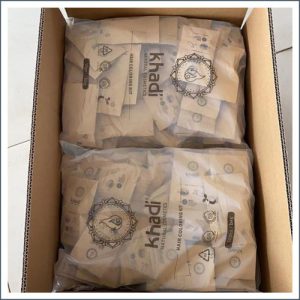
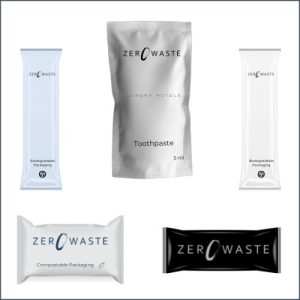
Our Amazing Service
Creative Team
Our team will advise you and design the products individually for your requirements and brand standards.
Services
Our team of experts would be happy to advise you on the subject of sustainability.
Contact us
We are at your disposal for advice and orders. info@zerowasteun.com

Sustainable Lifestyle
Navigation
Contact Us
Hacks Mühle 3
74934 Reichartshausen
Germany
(+49) 172-992 5972
info@zerowaste-global.com
